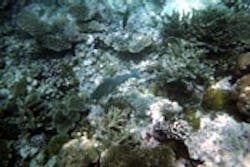Study Finds Contaminated Water Reaching Florida’s Offshore Keys
A new University of Georgia study finds that sewage-contaminated groundwater is reaching the offshore reefs of the Upper Florida Keys, possibly threatening corals and human health.
“The widespread use of in-ground waste disposal through septic tanks and injection wells appears to be leading to the contamination of submarine groundwater even up to six miles offshore,” said study author Erin Lipp, associate professor at the UGA College of Public Health. “When the contaminated groundwater mixes with surface water and reaches the reef, the corals as well as human health might be harmed.”
The findings were presented Tuesday at a meeting of the Florida Keys National Marine Sanctuary Water Quality Protection Program Steering Committee in Marathon, Fla.
Lipp and doctoral student Carrie Futch, along with Dale Griffin of the U.S. Geological Survey in Tallahassee, Fla., sampled surface water, groundwater and corals from five sites from nearshore to offshore beginning outside of Port Largo Canal and ending near Molasses Reef. Their three-year study revealed common fecal indicator bacteria and human viruses.
Lipp said the detection of these bacteria in predominantly nearshore stations suggests that land-based sources of sewage pollution such as cesspits and septic systems may be a significant contributor.
Genetic material from enteric viruses, which cause disease in humans but are only found in infected human feces and urine, also were commonly found throughout the sampled area, including ground water more than six miles offshore. The frequency of detecting viruses increased with rainfall in the summer months, when the viruses were most likely to be found in groundwater. Lipp cautioned, however, that the test used to identify the enteric viruses was not designed to determine whether the viruses were alive or dead.
Bill Kruczynski, Florida Keys Program Scientist for the U.S. Environmental Protection Agency, said the installation of new wastewater management systems such as centralized collection and advanced wastewater treatment facilities, as recommended by the Water Quality Protection Program (WQPP) for the Florida Keys National Marine Sanctuary and required by Florida State Law 99-395, is essential to restore and maintain water quality in the Florida Keys. In addition, the WQPP recommended improved storm water treatment practices to further reduce pollutant loading to nearshore waters.
The study was funded by the U.S. Environmental Protection Agency.
Source: University of Georgia
